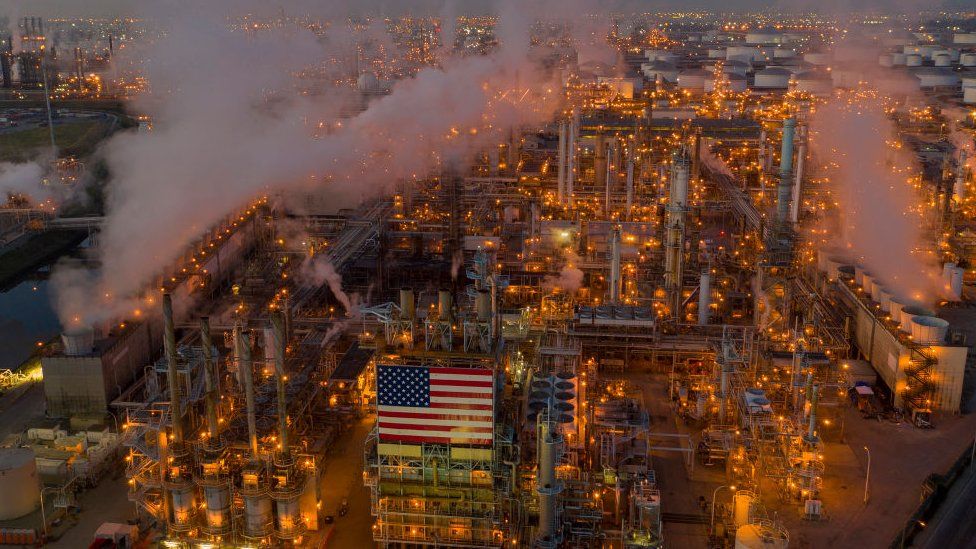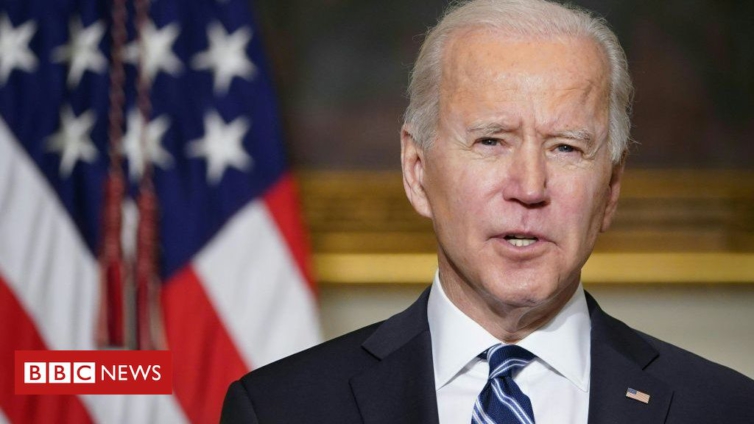US President Joe Biden has signed a series of executive orders designed to address climate change, including a new ban on some energy drilling.
The orders aim to freeze new oil and gas leases on public lands and double offshore wind-produced energy by 2030.
They are expected to meet stiff resistance from the energy industry and come as a sea change from Donald Trump, who cut environmental protections.
"Today is climate day at the White House," said Mr Biden on Wednesday.
"We have already waited too long," Mr Biden told reporters at the White House. "And we can't wait any longer."
Mr Biden said the US "must lead" a global response to the climate change crisis.
"Just like we need a unified national response to Covid-19, we desperately need a unified national response to the climate crisis because there is a climate crisis," he said.
He added that neither challenge could be met by the US alone.
The series of executive orders that Mr Biden signed on Wednesday establishes a White House office of domestic climate policy and announces a summit of leaders to be held in April on Earth Day.
Climate change, under Mr Biden's plan, will become both a "national security" and "foreign policy" priority, officials say.
Mr Biden is also calling upon the US director of national intelligence to prepare an intelligence report on the security implications of climate change.
What do the orders do?
Mr Biden is using his presidential powers to make climate change a central issue of his administration.
The executive orders and memorandum - which cannot go as far as congressional legislation in combating climate change - can be undone by future presidents, as he is currently doing to Mr Trump.
According to a White House statement, Mr Biden is directing the Department of the Interior to pause oil and gas drilling leases on federal lands and water "to the extent possible" and to launch a review of existing energy leases.
Mr Biden aims to conserve at least 30% of federal lands and oceans by 2030.

According to the New York Times, fossil fuel extraction on public lands accounts for almost a quarter of all US carbon dioxide emissions.
Mr Biden's order does not specifically address private property owners or state-held public lands.
He has signed more than three dozen executive orders in his first week in office, more than any of his predecessors.
Critics note he told ABC News while campaigning last October that only a "dictator" would use executive orders excessively. "We're a democracy," said Mr Biden, whose fellow Democrats now control all of Congress. "We need consensus."
What other climate measures is he taking?
Mr Biden's "whole-of-government" approach, the White House says, creates the position National Climate Advisor who will lead the office of Domestic Climate Policy at the White House.
The presidential climate envoy, former Secretary of State John Kerry, conceded to reporters on Wednesday that it would make little difference in the global climate change fight if the US reduced its emissions to zero.
"He [Mr Biden] knows Paris [climate accord] alone is not enough," Mr Kerry said. "Not when almost 90% of all of the planet's global emissions come from outside of US borders. We could go to zero tomorrow and the problem isn't solved."
The orders also direct federal agencies to prepare for the impact of climate change on their operations and improve access to information on the issue.
Mr Biden also directed agencies to only make "evidence-based decisions guided by the best available science and data".

Pausing the extraction of oil and gas from federal lands is the Biden administration's tremulous first step onto the toes of the US oil and gas industry.
Federal drilling is a key part of their output - providing around 22% of US oil production and 12% of gas, according to the American Petroleum Institute (API).
The API is unhappy with the move, suggesting that any ban will lead to greater reliance on imports as the US economy recovers and needs more energy.
But experts reject that argument, pointing out that drilling on public lands is likely to continue to expand even if a moratorium becomes a ban.
That's because only half of applications for extraction approved between 2014 and 2019 have actually been used.
Moving towards a ban on federal leases fulfils a campaign pledge and will reassure environmentalists that Joe Biden is the real deal when it comes to climate change. But making significant inroads into US carbon output will probably require legislation to be put before Congress.
That will be the true test of the Biden climate commitment.

What do the orders say about jobs?
Mr Biden's critics say his climate initiatives will cut jobs as the US already suffers from record unemployment numbers because of the Covid-19 pandemic.
He received a storm of criticism for last week's executive order halting construction of the Keystone XL pipeline, that would have transported oil from Canada through the US.
But the Biden White House is trying to get ahead of more criticism by addressing job creation.
"When I think of climate change, I think of jobs," Mr Biden said, arguing that "millions" of Americans will be able to get jobs "modernising our water systems, transportation, our energy infrastructure - to withstand the impacts of extreme climate".
His plan directs federal agencies to "identify new opportunities to spur innovation, commercialisation, and deployment of clean energy technologies and infrastructure".
It calls for the creation of a "Civilian Climate Corps Initiative" - an initiative Biden officials say will "put a new generation of Americans to work conserving and restoring public lands and waters".
How does it differ from Trump?
During his four years in office, Mr Trump expanded the number of energy leases on environmentally sensitive national lands.
The US achieved a level of energy independence in his term, becoming a net petroleum exporter, a milestone for which he claimed credit.
Mr Trump also rolled back dozens of rules designed to ensure access to clean air and water, protections for wildlife, and the containment of dangerous chemicals and pollutants.
Some of the changes, including one that sought to relax pollution rules affecting coal and gas-burning power plants, were overturned by federal courts.
Mr Trump - who once called climate change a hoax - also took the US out of the Paris climate accords, whereas Mr Biden made moves to re-join the global agreement on his first day in office.
Latest Stories
-
OSP lied about Ofori-Atta’s medical report – Frank Davies claims
8 minutes -
Defence Minister welcomes Northern chiefs in Central Region, praises their support
15 minutes -
Ghana’s most potent weapon against corruption is OSP – Kissi Agyebeng
25 minutes -
World Environment Day 2025: A call to eliminate plastic pollution in Africa
29 minutes -
Eid al-Adha celebration: Mahama prays for global peace
33 minutes -
Environment Minister calls for attitudinal change to end plastic pollution
34 minutes -
NAPO urges politicians, public office holders to embrace accountability
35 minutes -
Finance Minister hails outcome of National Economic Dialogue
44 minutes -
Ishmael Yamson appeals to Mahama to institutionalise National Economic Dialogue
46 minutes -
Bank of Ghana expands gold reserves amid global economic volatility
53 minutes -
Sunda International donates to Eid Al-Adha 2025 celebrations
1 hour -
KIVO donates to Eid Al-Adha 2025 celebrations
1 hour -
Ken Ofori-Atta is not sick, he’s playing hide and seek with OSP- Tanko Computer
2 hours -
“Aluta Continua”: Nurses’ strike persists as GRNMA awaits official injunction notice
2 hours -
A New Dawn in New Juaben: Daasebre Kwaku Boateng III’s visionary leadership ushers in transformation and unity
2 hours

